| Srl | Item |
| 1 |
ID:
094580
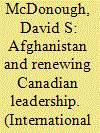

|
|
|
| 2 |
ID:
087649
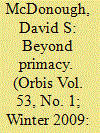

|
|
|
|
|
| Publication |
2009.
|
| Summary/Abstract |
The George W. Bush administration embraced a particularly aggressive counter-terrorist and counter-proliferation strategy after the 9/11 terrorist attacks. The "Bush Doctrine," as it became known, reflects a "primacist" approach to grand strategy that aims not only to eliminate global terrorist networks and cowl rogue state proliferators, but also to dissuade potential near-peer competitors from challenging the American-centred international system. Critics expect that this ambitious approach to strategic affairs has become unsustainable in the face of the growing quagmire in Iraq. But "security addiction" in the post-9/11 environment has instead created conditions for a bipartisan consensus on the overall direction, if not the particular modalities, of "primacist" grand strategies. Despite the unpopularity of the Bush administration and significant American commitments to Afghanistan and Iraq, it is highly unlikely that President Barack Obama will heed calls for military retrenchment or strategic restraint.
|
|
|
|
|
|
|
|
|
|
|
|
|
|
|
|
| 3 |
ID:
121225
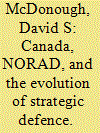

|
|
|
|
|
| Publication |
2012.
|
| Summary/Abstract |
Canada proved to be a reliable and cooperative partner of the Americans
on a variety of air defence initiatives in the early Cold War. Both countries
constructed a dense network of radar lines, prioritized their respective air
defence forces, and eventually agreed to a binational North American Air
Defence Command (NORAD), imbued with the operational control of both
countries' air defence forces. However, Canada's role in strategic defence
was just as quickly challenged by the development of intercontinental
ballistic missiles. NORAD's raison d'être shifted to the early warning and
tracking of these long-range delivery systems, even as Washington became
increasingly infatuated with the potential of missile defences from the late
1960s onward. Importantly, Canada consistently refrained from cooperating
with the United States on strategic missile defence.
|
|
|
|
|
|
|
|
|
|
|
|
|
|
|
|
| 4 |
ID:
081232
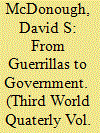

|
|
|
|
|
| Publication |
2008.
|
| Summary/Abstract |
Post-conflict stability remains an elusive goal for many African countries. The political and socioeconomic preconditions of African civil wars have often persisted after the end of open hostilities and have frustrated regional and international efforts at peace building. The growing role of non-state armed groups in post-conflict governments raises further questions on the important role of guerilla groups in either exacerbating or ameliorating the 'structural' preconditions of protracted African wars. The cases of Liberia, Uganda and Rwanda offer important insights on the complex interplay between armed groups and governments that underlie these conflicts. All three countries have been marked by devastating civil wars and the subsequent formation of post-conflict governments led by respective insurgent groups, but only Rwanda and Uganda have made any effort to mitigate the conditions that ultimately led to intra-state violence and state collapse. While the conflict dynamic may heavily condition an insurgent group, these factors alone do not play a determining role in the success or failure of peace building efforts
|
|
|
|
|
|
|
|
|
|
|
|
|
|
|
|
| 5 |
ID:
122298
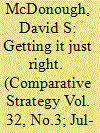

|
|
|
|
|
| Publication |
2013.
|
| Summary/Abstract |
Strategic culture provides a good starting point to explain Canada's goldilocks grand strategy. But it also has important theoretical shortcomings. This article offers an important reconceptualization of strategic culture. It synthesizes the insight from strategic culture and cybernetic theory to better account for Canadian strategic behavior. It introduces the notion of standing operational doctrines-continental soft-bandwagoning and defensive weak-multilateralism-through which Canada's strategic cultural beliefs, attitudes, and inclinations are standardized and regularized. This theoretical synthesis provides strategic culture with greater specificity, better use as a causal explanation, and can be potentially applied to other cases.
|
|
|
|
|
|
|
|
|
|
|
|
|
|
|
|
| 6 |
ID:
058948
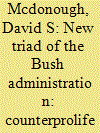

|
|
|
| 7 |
ID:
074359
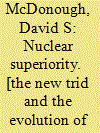

|
|
|
|
|
| Publication |
London, IISS, 2006.
|
| Description |
111p.
|
| Series |
Adelphi Paper; 383
|
| Standard Number |
9780415427340
|
|
|
|
|
|
|
|
|
|
|
|
Copies: C:1/I:0,R:0,Q:0
Circulation
| Accession# | Call# | Current Location | Status | Policy | Location |
| 051746 | 355.825119/MCD 051746 | Main | On Shelf | General | |
|
|
|
|
| 8 |
ID:
124873


|
|
|
|
|
| Publication |
2013.
|
| Summary/Abstract |
This article explores the possible long-term trajectory of America's "pivot" to the Asia-Pacific and its implications for Canada's security policy. It shows that Obama's pivot represents the beginnings of a strategic choice on "selective primacy," which, due to Washington's worrisome fiscal situation and push towards a more specialized force structure, promises to only deepen in the future. In the second half of the article, I examine how Canada will likely respond to America's more sustained strategic adjustment to the Pacific based on a reading of how the country traditionally adapts to American strategic preferences. The article concludes with some thoughts on an expanded Canadian effort at maritime diplomacy and the future of a Pacific-centric Royal Canadian Navy.
|
|
|
|
|
|
|
|
|
|
|
|
|
|
|
|
| 9 |
ID:
080138


|
|
|